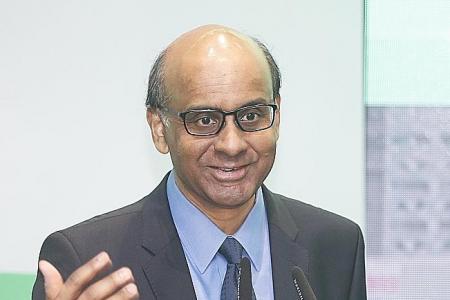Spread solutions from city to city: Tharman
DPM Tharman says global community must help developing world face challenges as these will inevitably spill over
The developing world may bear the brunt of a multitude of challenges, but it is the responsibility of the global community to help them solve these problems, Deputy Prime Minister Tharman Shanmugaratnam said yesterday.
He said the developing world, especially poorer countries experiencing surges in their younger workforce, may face the most severe challenges in dealing with such situations.
"But if the problems are not tackled effectively in any one part of the world, they will inevitably spill over into the global environment - whether through the spread of infectious diseases, forced migration or the spread of conflict and insecurity," he said.
SUSTAINABILITY
Mr Tharman was speaking at the joint opening ceremony of three sustainability events - the World Cities Summit, Singapore International Water Week and the CleanEnviro Summit Singapore.
At these events at Marina Bay Sands, global leaders and companies will look at emerging challenges and strategies in dealing with issues including climate change and rapid urbanisation.
About 20,000 attendees from 100 countries, including former United Nations secretary-general Ban Ki Moon, are expected to attend the conferences.
A range of technological solutions will also be on show, including robotic swans that can monitor water quality.
Mr Tharman said the need to innovate is crucial, especially as risks - such as poorly managed urbanisation, climate change, infectious disease threats, growing young populations that are ill-equipped for the future of work and unequal rather than inclusive growth in many societies - are coming together and compounding one another.
The global community, whether scientists, governments, or the private sector, can contribute innovations and solutions to solving problems elsewhere, he said.
"There is great scope to spread solutions from one city to another, from one part of the world to another," said Mr Tharman.
"Whether our countries are poor, rich or middle income, there is immense opportunity to learn from each other, to ensure a more sustainable environment, effective investments in human capital and urban planning that encourages cohesive rather than segregated communities," he said.
Get The New Paper on your phone with the free TNP app. Download from the Apple App Store or Google Play Store now



